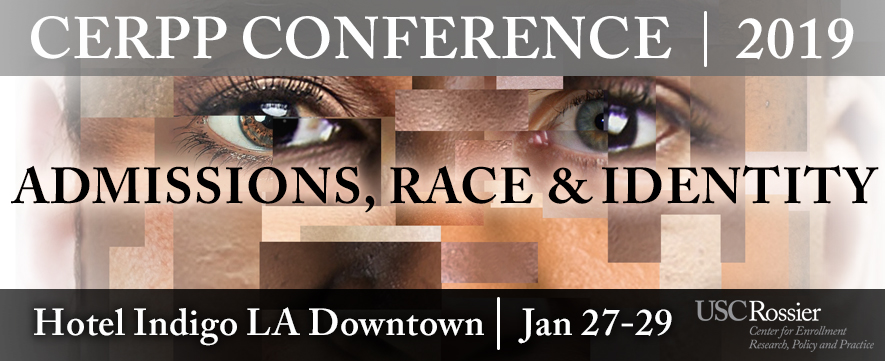
CERPP Conference 2019: Admissions, Race & Identity
CERPP Conference 2019: Admissions, Race and Identity took stock of the critical conversations that are taking place on campus and throughout the nation on race and identity. The aims were to raise consciousness on issues of race and identity formation and to explore how this awareness may inform more inclusive and effective admission policy and practice.
We hosted a sold-out audience of nearly 200, comprised of the leading graduate and undergraduate admission deans, campus enrollment policy makers, higher education scholars, K-12 educators, and state and federal policy makers. Prominent scholars and leaders provided a powerful combination of mind-opening and practice-strengthening master classes and workshops.
CERPP Conference 2019
The Chronicle of Higher Education. January 31, 2019. "Lawyers on Race-Conscious Admissions: ‘This Is Doable. But Also, Do It Right.’"
In her article, Nell Gluckman featured a thoughtful panel on the takeaways from 40 years of legal precedent on affirmative action with Kedra Ishop of the University of Michigan and Art Coleman and Jamie Keith of EducationCounsel. The article also highlighted the presentations of Stella Flores from NYU on race in college admissions, as well as USC Rossier School of Education scholars, Darnell Cole on the role of race and identity in admissions and Julie Posselt on whiteness as meritocracy in admissions.
In her article, Nell Gluckman featured a thoughtful panel on the takeaways from 40 years of legal precedent on affirmative action with Kedra Ishop of the University of Michigan and Art Coleman and Jamie Keith of EducationCounsel. The article also highlighted the presentations of Stella Flores from NYU on race in college admissions, as well as USC Rossier School of Education scholars, Darnell Cole on the role of race and identity in admissions and Julie Posselt on whiteness as meritocracy in admissions.
CERPP Conference 2019 Program (click to download)
Please click on each day for the conference blog, which provides a summary of each session. All available presentations are linked to as PDFs.
Conference Blog: Day 1 (January 27)
Welcome
Jerome A. Lucido, Professor of Research; Associate Dean for Strategic Enrollment Services; Executive Director, Center for Enrollment Research, Policy and Practice, Rossier School of Education, University of Southern California
Opening Keynote. Race & Identity: Why It Matters
Darnell Cole, Associate Professor; Co-founding Director of the Center for Education, Identity and Social Justice; Rossier School of Education, University of Southern California
Conference Blog: Day 2 (January 28)
Session 1. Does Whiteness Equal Meritocracy in Admissions?
Julie Posselt, Assistant Professor. Rossier School of Education, University of Southern California
Session 2. Identity Formation and Intersectionality
Ange-Marie Hancock Alfaro, Dean’s Professor and Chair of the Department of Gender & Sexuality Studies, University of Southern California
Session 3. Workshop: Identity in Holistic Review
Panelists:
Sylvia Hurtado, Professor of Education; former Director of the Higher Education Research Institute, University of California, Los Angeles
Session 5. Workshop: Training to Avoid Implicit Bias
Panelists:
Conference Blog: Day 3 (January 29)
Session 6. What Does Research Tell Us About the Consideration of Race?
Stella Flores, Associate Dean and Associate Professor; Director of Access and Equity at the Steinhardt Institute for Higher Education Policy, New York University
Session 7. Workshop: Considering Race in Admissions: Practical Lessons from the Courts
Panelists:
Please click on each day for the conference blog, which provides a summary of each session. All available presentations are linked to as PDFs.
Conference Blog: Day 1 (January 27)
Welcome
Jerome A. Lucido, Professor of Research; Associate Dean for Strategic Enrollment Services; Executive Director, Center for Enrollment Research, Policy and Practice, Rossier School of Education, University of Southern California
Opening Keynote. Race & Identity: Why It Matters
Darnell Cole, Associate Professor; Co-founding Director of the Center for Education, Identity and Social Justice; Rossier School of Education, University of Southern California
Conference Blog: Day 2 (January 28)
Session 1. Does Whiteness Equal Meritocracy in Admissions?
Julie Posselt, Assistant Professor. Rossier School of Education, University of Southern California
Session 2. Identity Formation and Intersectionality
Ange-Marie Hancock Alfaro, Dean’s Professor and Chair of the Department of Gender & Sexuality Studies, University of Southern California
Session 3. Workshop: Identity in Holistic Review
Panelists:
- Richard Shaw, Dean of admission, Stanford University
- Marie Bigham, Director of College Counseling, Isidore Newman School
- Kedra Ishop, Vice Provost for Enrollment Management, University of Michigan–Ann Arbor
Sylvia Hurtado, Professor of Education; former Director of the Higher Education Research Institute, University of California, Los Angeles
Session 5. Workshop: Training to Avoid Implicit Bias
Panelists:
- Rakin Hall, Executive Director of Admission, University of Utah
- Joyce Balak, Director of Admission and Financial Aid, Laguna Blanca School
- Kasey Urquidez, Vice President for Enrollment Management and Dean of Undergraduate Admissions, University of Arizona
Conference Blog: Day 3 (January 29)
Session 6. What Does Research Tell Us About the Consideration of Race?
Stella Flores, Associate Dean and Associate Professor; Director of Access and Equity at the Steinhardt Institute for Higher Education Policy, New York University
Session 7. Workshop: Considering Race in Admissions: Practical Lessons from the Courts
Panelists:
- Art Coleman, Managing Partner and Co-founder, EducationCounsel LLC
- Jamie Lewis Keith, Partner, EducationCounsel LLC
- Kedra Ishop, Vice Provost for Enrollment Management, University of Michigan–Ann Arbor
Institute for Immigration, Globalization and Education, UCLA and ACT Center for Equity in Learning (2017). The Racial Heterogeneity Project: Implications for educational research, practice and policy. Retrieved from https://equityinlearning.act.org/research-doc/racial-heterogeneity-project-implications-educational-research-practice-policy/
A recent report sponsored by the ACT Center for Equity in Learning looks at the importance of data disaggregation and provides recommendations for education advocates, practitioners and policymakers. The Racial Heterogeneity Project aims to address:
Bastedo, M.N. & Bowman, N.A. (2017). Improving admission of low-SES students at selective colleges: Results from an experimental simulation. Educational Researcher, 46(2): 67-77. https://doi.org/10.3102/0013189X17699373 Low-socioeconomic status (SES) students are underrepresented at selective colleges, but the role that admissions offices play is poorly understood. Because admissions offices often have inconsistent information on high school contexts, we conducted a randomized controlled trial to determine whether providing detailed information on high school contexts increases the likelihood that admissions officers (n = 311) would recommend admitting low-SES applicants. Admissions officers in the detailed-information condition were 13 to 14 percentage points (i.e., 26%–28%) more likely to recommend admitting a low-SES applicant from an underserved high school than those in the limited-information condition, although the limited-information condition provided significant details about family SES and high school context
Bowman, N.A. & Bastedo, M.N. (2018). What role may admissions office diversity and practices play in equitable decisions? Research in Higher Education, 59(4): 430-447. https://doi.org/10.1007/s11162-017-9468-9 This study examined a unique national sample of 311 undergraduate admissions officers who work at selective institutions to explore this issue. Among the descriptive findings, more than half of respondents reported that they consider applicants’ demonstrated interest in attending their institution when making a recommendation, about two-thirds review at least 100 applications during busy weeks, and almost half were working at their alma mater. Moreover, in a simulation of admissions scoring, admissions officers from historically underrepresented groups were more likely to admit low-SES applicants, whereas participants with more work experience and who were employed at their alma mater provided less equitable recommendations.
Bowman, N. A., & Felix, V. (2017). It’s who I am: Student identity centrality and college student success. Journal of Student Affairs Research and Practice, 54(3): 235–247. https://doi.org/10.1080/19496591.2017.1331853 This article proposes the concept of student identity centrality, which is defined as the extent to which being a student is important to one’s self-image or identity. This study found student identity centrality was positively related to goal commitment, institutional commitment, and intent to persist, even when controlling for precollege attributes and college experiences.
- How the current, broad racial categories are a unique challenge for each racial/ethnic subpopulation
- How inaccurate data practices hinder the ability for practitioners and policymakers to understand and respond to the unique needs of each racial/ethnic population
- Approaches and strategies that should be considered to better support each racial/ethnic population
- Implications for policy and practice to better understand and respond to racial heterogeneity.
Bastedo, M.N. & Bowman, N.A. (2017). Improving admission of low-SES students at selective colleges: Results from an experimental simulation. Educational Researcher, 46(2): 67-77. https://doi.org/10.3102/0013189X17699373 Low-socioeconomic status (SES) students are underrepresented at selective colleges, but the role that admissions offices play is poorly understood. Because admissions offices often have inconsistent information on high school contexts, we conducted a randomized controlled trial to determine whether providing detailed information on high school contexts increases the likelihood that admissions officers (n = 311) would recommend admitting low-SES applicants. Admissions officers in the detailed-information condition were 13 to 14 percentage points (i.e., 26%–28%) more likely to recommend admitting a low-SES applicant from an underserved high school than those in the limited-information condition, although the limited-information condition provided significant details about family SES and high school context
Bowman, N.A. & Bastedo, M.N. (2018). What role may admissions office diversity and practices play in equitable decisions? Research in Higher Education, 59(4): 430-447. https://doi.org/10.1007/s11162-017-9468-9 This study examined a unique national sample of 311 undergraduate admissions officers who work at selective institutions to explore this issue. Among the descriptive findings, more than half of respondents reported that they consider applicants’ demonstrated interest in attending their institution when making a recommendation, about two-thirds review at least 100 applications during busy weeks, and almost half were working at their alma mater. Moreover, in a simulation of admissions scoring, admissions officers from historically underrepresented groups were more likely to admit low-SES applicants, whereas participants with more work experience and who were employed at their alma mater provided less equitable recommendations.
Bowman, N. A., & Felix, V. (2017). It’s who I am: Student identity centrality and college student success. Journal of Student Affairs Research and Practice, 54(3): 235–247. https://doi.org/10.1080/19496591.2017.1331853 This article proposes the concept of student identity centrality, which is defined as the extent to which being a student is important to one’s self-image or identity. This study found student identity centrality was positively related to goal commitment, institutional commitment, and intent to persist, even when controlling for precollege attributes and college experiences.







No comments have been posted yet.